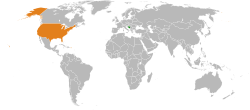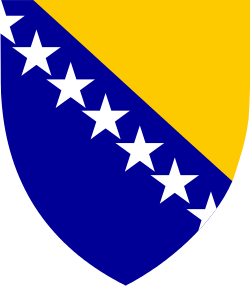Bosnia and Herzegovina–United States relations
 |
|
Bosnia and Herzegovina |
United States |
|---|---|
The 1992-95 war in Bosnia and Herzegovina was ended with the help of participation by the United States in brokering the 1995 Dayton Agreement. The United States maintains command of the NATO headquarters in Sarajevo. The United States has donated hundreds of millions of dollars to help with infrastructure, humanitarian aid, economic development, and military reconstruction in Herzegovina and Bosnia. The U.S. Agency for International Development (USAID) and Support for Eastern European Democracies (SEED) has played a large role in post-war Bosnia and Herzegovina, including programs in economic development and reform, democratic reform (media, elections), infrastructure development, and training programs for Bosnian professionals, among others. Additionally, there are many non-governmental organizations (NGOs) that have likewise played significant roles in the reconstruction.[1]
According to the 2012 U.S. Global Leadership Report, 33% of Bosnia and Herzegovina's people approve of U.S. leadership, with 49% disapproving and 18% uncertain.[2]
Diplomatic missions
The U.S. Embassy in Bosnia and Herzegovina is in Sarajevo. Bosnia and Herzegovina has an embassy in Washington, D.C.[3]
The US Ambassador is Maureen Cormack.
See also
References
- ↑ http://www.state.gov/r/pa/ei/bgn/2868.htm#relations
- ↑ U.S. Global Leadership Project Report - 2012 Gallup
- ↑ "Archived copy". Archived from the original on 2009-09-04. Retrieved 2010-03-01.
![]() This article incorporates public domain material from the United States Department of State website http://www.state.gov/r/pa/ei/bgn/index.htm (Background Notes).
This article incorporates public domain material from the United States Department of State website http://www.state.gov/r/pa/ei/bgn/index.htm (Background Notes).
External links
| Wikimedia Commons has media related to Relations of Bosnia and Herzegovina and the United States. |

.svg.png)